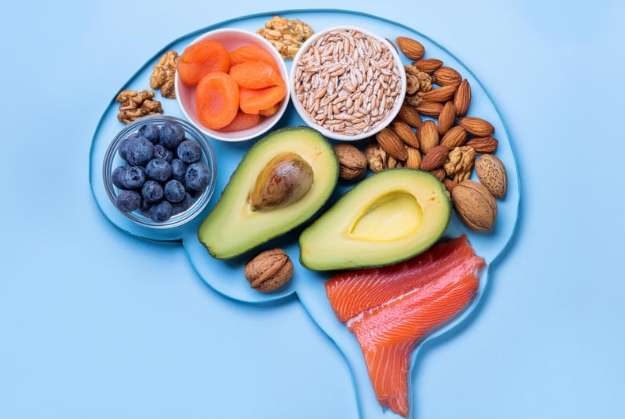As we age, maintaining brain health becomes increasingly important – not just for memory, but also for independence, emotional well-being, and overall quality of life. A balanced diet plays a vital role in preserving cognitive health in seniors. Certain nutrients and eating patterns can significantly affect the risk of cognitive decline and dementia.
Key Nutrients that Support Brain Health
- Antioxidants: Found in fruits, vegetables, and nuts, antioxidants help protect the brain from oxidative stress, a factor in cognitive decline and neurodegenerative diseases. They neutralize free radicals – harmful molecules that can damage brain cells.
- Omega-3 Fatty Acids: Abundant in fatty fish (like salmon), walnuts, and flaxseeds, omega-3s are essential for brain structure and function. They support memory, learning, and may slow age-related cognitive decline.
- B vitamins: Vitamins B6, B12 and folate are crucial for nerve function and the production of neurotransmitters. Deficiencies in these vitamins can impair brain function and contribute to memory problems.
- Flavonoids: These natural compounds reduce inflammation, fight oxidative stress, and enhance blood flow to the brain. You’ll find flavonoids in foods like berries, dark chocolate, and tea.
- Hydration: Even mild dehydration can affect focus, mood, and short-term memory. Drinking enough water throughout the day is essential for optimal brain performance.
Brain Healthy Diets
- Mediterranean Diet: This diet emphasizes fruits, vegetables, whole grains, legumes, nuts, seeds, olive oil, and fish, with moderate amounts of poultry and dairy. Rich in antioxidants and healthy fats, it has been linked to a reduced risk of Alzheimer’s and slower cognitive decline.
- MIND Diet (Mediterranean-DASH Intervention for Neurodegenerative Delay): Combining elements of the Mediterranean and DASH diets, the MIND diet was specifically designed to support brain health. It focuses on leafy greens, berries, nuts, and whole grains, while limiting red meat, butter, cheese, and fried foods.
- DASH Diet (Dietary Approaches to Stop Hypertension): Originally created to manage blood pressure, the DASH diet includes plenty of fruits, vegetables, whole grains, and lean proteins. It also supports brain health and may reduce the risk of cognitive decline.
Harmful Dietary Habits
Certain dietary habits can negatively impact brain health:
- Saturated and Trans Fats: Common in processed foods, fast food, and some animal products, these fats promote inflammation and are linked to an increased risk of cognitive decline.
- Excessive Sugar Intake: Too much sugar can impair memory and overall brain function. It may also raise the risk of neurological conditions, including Alzheimer’s disease.
- Refined Carbohydrates: Highly processed foods, sugary drinks, white bread, and pastries have been associated with poor cognitive performance and a higher risk of dementia.
- Sodium: A diet high in sodium can contribute to hypertension, which increases the risk of stroke and cognitive issues.
Recommendations for Seniors
- Eat a balanced diet focused on whole, minimally processed foods.
- Stay hydrated by drinking water throughout the day.
- Limit processed food, sugary drinks, and unhealthy fats.
- Consider supplements if dietary intake is lacking – consult a healthcare provider first.
- Stay physically active, as exercise supports both physical and mental health.
Conclusion
Choosing nutrient rich, whole foods can help seniors protect their brain health and improve overall well-being.
If you’re assisting a loved one in exploring senior living options, be sure to ask about dining services and whether the menu includes brain-healthy choices.






